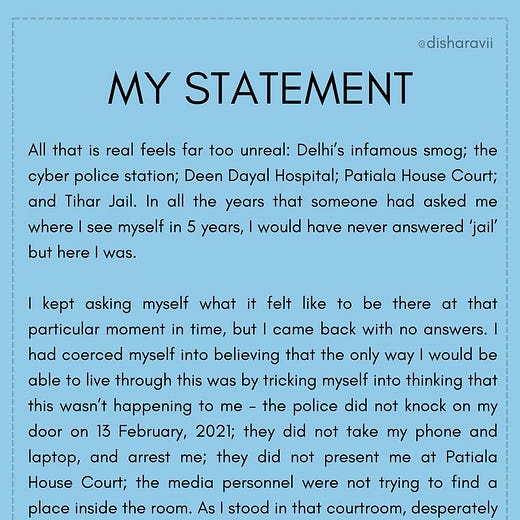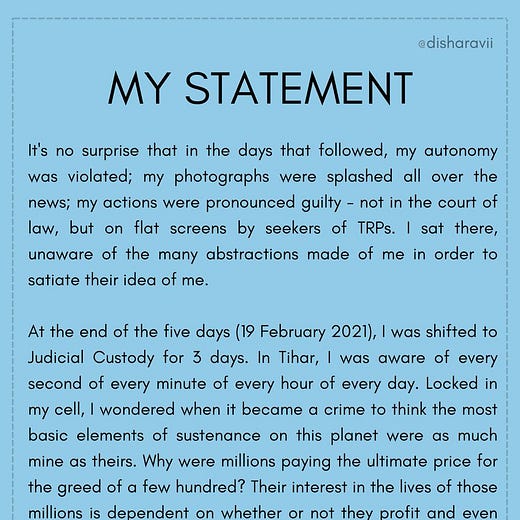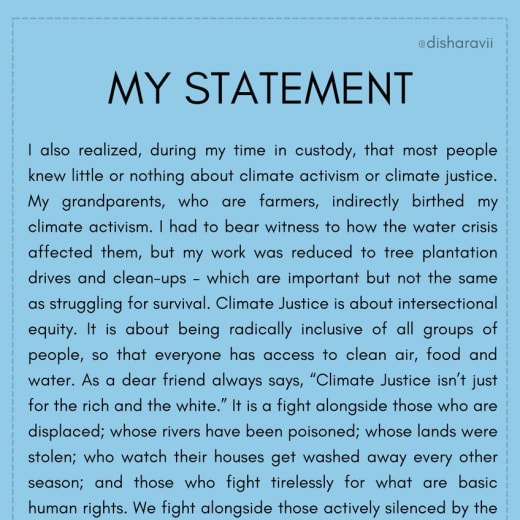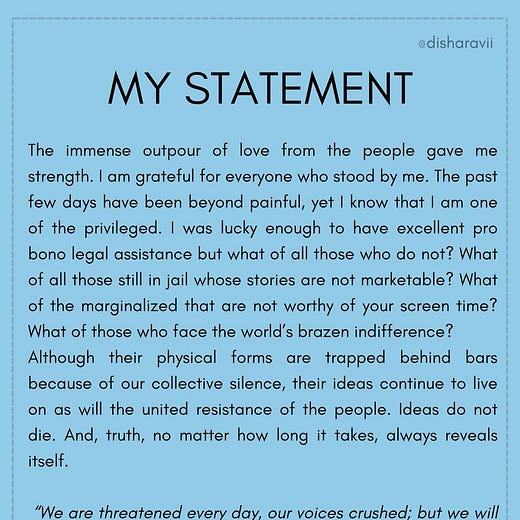The India Cable: UN Body Urges Compensation For Zargar; Jaishankar Spurns ‘Foreign Certificates’
Plus: Raghuram supports bank strike, Disha Ravi speaks, diaspora internationalises identity politics, Uttarakhand CM prophesies Modi worship, Tamil crypto guy buys world’s most expensive JPG file
From the founding editors of The Wire—MK Venu, Siddharth Varadarajan and Sidharth Bhatia—and journalists-writers Seema Chishti, Sushant Singh and Tanweer Alam. Editor: Pratik Kanjilal
Snapshot of the day
March 15, 2021
Pratik Kanjilal
The Working Group on Arbitrary Detention (WGAD) of the inter-governmental UN Human Rights Council of 47 nations (including India) has adopted the opinion that the arrest of Safoora Zargar of Jamia Millia Islamia University, following protests against the Citizenship (Amendment) Act and the Delhi ‘riots’, was arbitrary and its process irregular. Zargar was pregnant at the time of her arrest. The WGAD found that the charges against her concerned free speech, and that subsequent to arrest, she was burdened with charges under additional sections to make it difficult for her to secure bail. “The appropriate remedy would be to accord Ms. Zargar an enforceable right to compensation and other reparations, in accordance with international law.” The question of reparation is rarely discussed in India, despite the vast number of arbitrary arrests and wrongful confinement under the law.
New Covid-19 cases this week registered a sharp spike 33% higher than the previous week’s figure. In absolute numbers, this is the biggest weekly count since mid-December and in percentage terms, the sharpest surge since July 2020. The death rate is also rising, almost in tandem. On Friday, India had seen the worst single-day rise in new cases since December 24, and the capital showed a similar spike.
In a cryptic statement, Finance Minister Nirmala Sitharaman has promised to leave open a “window” for the cryptocurrency industry, which had feared a complete shutdown by law. The Cryptocurrency and Regulation of Official Digital Currency Bill is expected to be introduced in the current Budget session. In January, a Lok Sabha bulletin had stated that the bill would ban all private cryptocurrencies in India, while promoting the underlying blockchain technology ― that probably means no Bitcoin or analogues, which the Reserve Bank of India mistrusts for obvious reasons.
Sri Lanka will ban burqas and about 1,000 madrasas, in the interest of national security. Cabinet approval for the move is awaited. Muslims account for 9% of the island’s population. Burqas were temporarily banned following the Easter Sunday bombings in 2019.
Lending indirect support to the two-day strike called by a section of public sector bank employees against the Centre’s plan to privatise two PSU banks, former RBI governor Raghuram Rajan said the government’s move would be utterly foolish. “I think it would be a colossal mistake to sell the banks to industrial houses,” Rajan said in an interview to news agency PTI.
Yesterday, Jagan Reddy’s YSR Congress won a landslide victory in the urban body elections in Andhra Pradesh, winning 74 out of 75 municipalities and trends suggest that it may win in all the 12 corporations.
India’s ODI captain Mithali Raj became the first woman to score 7,000 runs in the format, playing against South Africa in Lucknow. On the weekend, she became the second woman cricketer in the world to cross the mark of scoring 10,000 runs in international cricket.
CA Bhavani Devi of Chennai has become the first Indian fencer to qualify for the Olympics. In 2018, she became the first Indian to win gold in the Commonwealth Championships, after defeating Emily Ruaux of the UK 15-12. The daughter of a temple priest in Washermanpet, she has been training after the lockdown in Livorno, where her coach is based.
Uttarakhand Chief Minister Tirath Singh Rawat has swung into action immediately after taking office. At ‘Netra Kumbh’, an event at an Ayurvedic college, he said that just like Lord Rama is worshipped for his good deeds, in the future, people will worship Prime Minister Narendra Modi.
UN refers Zargar detention matter to special rapporteurs
Following its adverse opinion against the Indian government for the detention of university student Safoora Zargar, a UN human rights Working Group against Arbitrary Detentions has referred the case to three Special Rapporteurs for action. In a statement, Zargar thanked the UN body for “taking cognizance” of the case, and termed it part of an “unfortunate trend”. She also said: “I am lucky and thankful and at the same time hope that the situation for all human rights defenders will improve in future and that all political prisoners [will] be immediately released, unconditionally.”
In an unrelated event, speaking on India’s continued downgrading on various indices and criticism over democractic backsliding, Foreign Minister S Jaishankar, speaking at a media event in Chennai said: “A set of self-appointed custodians of the world find it very difficult to stomach that somebody in India is not looking for their approval. It’s not about democracy or autocracy, it’s hypocrisy. I don’t need a certification from outside who have an agenda.” However, tweets by a Caribbean popstar and a teenaged climate activist had rattled the government so much that it issued a full blown statement, and marshalled its local talent against global stars in a very petty losing battle.
Last April, the Centre had set up an ‘index monitoring cell’ to track 32 global indices of concern to the Modi government, in several of which India had tanked. The 15-member committee (10 of whom are government servants) held four meetings between May and December last year and has submitted a report, with a 12-page dissent note by Magsaysay award winning journalist P Sainath. He has said the right to dissent is central to press freedom. He has pointed out 52 media-related laws misused by the state to intimidate journalists, adding that the state is completely unaccountable.
Disha Ravi speaks
In her first statement since her arrest in February, 23-year-old climate change activist Disha Ravi on Saturday gave a detailed account of her detention. She said that her autonomy was violated, her photos were splashed in the news and she was pronounced guilty by TRP-seeking news channels. Apart from this, of course, she suffered vicious and obscene trolling online from the usual quarters.
India-Pak meet on Indus ahead
In fresh signs of a deepening thaw, the Indus Commissioners of India and Pakistan will meet in Delhi on March 23-24 to discuss a host of issues, including Islamabad’s concerns about the design of Indian hydropower projects on the Chenab. The annual meeting of the Permanent Indus Commission will be held after a gap of nearly two and a half years. The last meeting was held in Lahore in August 2018. Under the provisions of the Indus Water Treaty, the commissioners are required to meet at least once a year, alternately in India and Pakistan.
Last year’s meeting, scheduled for March 2020 in New Delhi, was cancelled for the first time ever due to the pandemic. In July 2020, India proposed a virtual meeting to discuss pending issues, but Pakistan insisted on holding the talks at the Attari checkpost. However, India said it was not a good idea due to the pandemic.
FTA partners object at WTO
India’s free trade partners like Japan, South Korea, Malaysia and Sri Lanka have objected at the World Trade Organization, that its insistence on additional documents to establish the origin of imported goods raises non-tariff barriers. Following an amendment to the 1962 Customs Act in the FY21 budget, the Finance Ministry issued a notification under Customs (Administration of Rules of Origin under Trade Agreements) Rules, 2020 (CAROTAR), mandating documents beyond the usual certificate of origin to claim tariff benefits under free trade agreements.
Bank strike against privatisation begins
Banking operations across the country could be impacted on Monday and Tuesday as the United Forum of Bank Unions (UFBU), an umbrella body of nine unions, has given a call for a nationwide strike to protest against the proposed privatisation of two state-owned lenders. Services such as deposits and withdrawals at branches, cheque clearance and loan approvals would be affected due to the strike. About 10 lakh bank employees and officers of the banks will participate in the strike.
The Long Cable
BJP identity politics infects diaspora, and the world
Sidharth Bhatia
Tensions are rising in the Indian diaspora and Hindu nationalists and Sikhs have clashed in countries as far apart as Australia and Canada. The immediate provocation seems to be the support of many Sikhs in these countries to the farmers’ protests in India. In Britain, opposition members of parliament had to warn the government about the potential dangers of rallies near Sikh gurdwaras.
Earlier this month, a car with four Sikh men was attacked in the Sydney suburb of Harris by a group of Indian men carrying bats and hammers. This came on the heels of a convoy of cars with Indian flags that was planning to drive by a Sikh congregation but was stopped by the police. Sikh leaders said they suspected that the groups in the car were planning to damage the gurudwara.
An Australian commentator called these incidents a “clear demonstration of how the BJP’s identity politics is capturing segments of the Indian diaspora in Australia, presenting a distinct problem for the country’s authorities.”
In the Toronto suburb of Brampton, home to a large number of Indians, protests and counter-protests by Sikhs who support the farmers led to several skirmishes.
Three Labour MPs recently warned UK Home Secretary Priti Patel that she should intervene and ensure that rallies across cities such as Birmingham and London were not held because they could cause disturbances.
https://barficulture.tv/world/946
Relations have always been cold, even suspicious, between Sikh groups and many others from the Indian diaspora in these countries. The Sikhs are viewed with suspicion as backers of a Sikh homeland, Khalistan, even though such support is not particularly widespread. The Indian government too has conveyed its fears to host governments. Often, influential leaders have been singled out ― Jagmeet Singh, leader of the left-oriented National Democratic Party (NDP), has been denied a visa to India.
The farmers’ protests have become a flashpoint. Many Sikhs who still retain links with Punjab and come from families involved in farming have voiced their full support to the protesters. The BJP and the RSS have their followers, too. Former suspicion has given way to open hostility.
The BJP had begun to make deep inroads in Indian communities abroad, and the process has been further boosted after Narendra Modi came to power. His rallies in Houston in Texas and Wembley in London as far back as in 2015 brought tens of thousands of Indians to cheer him. After Howdy Modi, where he made an implicit appeal for support to Donald Trump, he may not have held such events, but the BJP and RSS have continued to work among Hindus and several influential young professionals have emerged in public life.
Sikhs have been in public life for much longer and now have several MPs in Canada and Britain. Some, like Tanmanjeet Singh Dhesi in Britain, have raised the matter of the farmers’ protests in the British parliament, angering the Indian government.
Indian communities in other countries were never tightly knit in the first place and have differences – often on grounds of linguistic and caste background. But being a minority in those countries meant there were common concerns which occasionally brought them together. Now, pre-existing breaches are widening as the politics ‘back home’ becomes a major flashpoint. The farmers’ protests have sharpened the divides and relations are bound to get much worse.
Reportedly
As someone on social media remarked, Tamil Nadu manifestos are increasingly resembling “dowry lists.” The ruling AIADMK has announced it will give washing machines and solar panels. A slew of commentary followed, asking if this can liven up the elections. It is currently meant to be the DMK alliance’s to lose. Manifesto promises in Tamil Nadu are serious business. Stalin has promised 10 lakh jobs. There was a lot of scepticism when the DMK had offered coloured TVs as sops in 2006. But that was a time when TV, and therefore news and information channels like National Geographic were seen by parents as useful for children. The DMK won. Historically, the state has pioneered materially useful electoral interventions, like mid-day meals in schools.
Prime Number: $580.3 bnIndia’s foreign currency holdings on March 5, now slumped by $4.3 billion, is the world’s fourth largest, the Reserve Bank of India said on Friday. India pulled ahead as Russian holdings declined at a faster rate in recent weeks to $580.1 billion. China has the largest reserves, followed by Japan and Switzerland on the International Monetary Fund table.Nitish ko gussa nahi aata
Bihar Chief Minister Nitish Kumar has been increasingly in the news for the wrong reasons and for losing his shirt at the slightest provocation. He appealed to the media yesterday to go easy on him. “I sometimes say some things. It doesn’t mean that I’m angry with anyone. I don’t get angry. Do not think that I’m angry because I’m speaking loudly,” he said.
Malik frets, Balyan plays statue
Meghalaya governor Satya Pal Malik on Sunday waded into the farmers’ protest and said the Modi government should accept one of their demands ― of writing minimum support price (MSP) into law ― and advised it against using the might of the state against the farmers. Malik was addressing a gathering after his felicitation at Sheelchand Inter College in Aminagar Sarai town of his native district Baghpat in Uttar Pradesh. He is from Hisawda village of the district.
He said that he had written to Prime Minister Narendra Modi and Union Home Minister Amit Shah about the farmers’ agitation. Visibly perturbed about the stir, he said that a governor was supposed to be silent on certain issues, but, “I went against this norm because I am also the son of a farmer and understand the pain and problems of farmers.”
The Bhartiya Kisan Union-led farmer agitation may continue till December, the outfit leader and spokesperson Rakesh Tikait said after visiting West Bengal. In Nandigram, where Chief Minister Mamata Banerjee faces her former acolyte Suvendu Adhikari, he asked voters not to vote BJP.
Reduced to desperation by his failure to carry out his assigned task of breaking the farmers’ movement, Union minister Sanjeev Balyan is promising statues of local icons if protests are called off. Earlier, farmers had lined both sides of the road and shown black flags to Balyan while he was travelling the 20 km from Baghpat town to Ramala. The police arrested half a dozen farmers and released them later.
Quad is not the new NATO
The four leaders of the virtual Quad summit on March 12, US President Joe Biden and prime ministers Narendra Modi, Scott Morrison and Yoshihide Suga, have jointly penned an op-ed in the Washington Post. It dwells on the widened ambit of the grouping, apart from its core task of ensuring that the Indo-Pacific is accessible and dynamic, code for ensuring China does not dominate the maritime zone. They have described the Quad as a group of democratic nations dedicated to delivering results through practical cooperation.
In a wide-ranging interaction at a TV channel’s event, foreign minister S Jaishankar acknowledged that on the China border, “We went through a very difficult period and I think we are still not past it.”
Deep Dive
Killing video stars
Web streaming OTT was supposed to be the Wild West for filmmakers, but the new IT rules will kill creativity and hamper the business. It thrives on creative expression and had turned to the web to break free of the shackles of censorship. Lata Jha explains.
Tamil crypto tycoon buys JPG file for $69.3 million
Singapore-based Indian cryptocurrency investor Metakovan has bought an artwork by digital artist Beeple for $69.3 million. Various media reports said that Metakovan is a pseudonym of the investor, which means King of Meta in Tamil. His real identity is unknown, but he is co-founder of the socially-motivated crypto-based fund Metapurse. The investor acquired the piece titled Everydays: The First 5,000 Days, for $69,346,250 (about Rs 504 crore), according to the auction house Christie’s. The price jumped from the $20 million range to over $50 million in the last minutes of the auction. The work in question is a mosaic of 5,000 artworks made over the last 13 years by Mike Winkelmann, who signs his works ‘Beeple’. Everydays is a JPG file, not a canvas.
Op-Eds you don’t want to miss
It would be a grievous error for India to underestimate the extent of the cyber threat it faces, especially from China, writes MK Narayanan.
Bharat Bhusan writes on the Scania bus scam, where the allegations of bribe-fuelled bus contracts have to be investigated by state governments. However, BCCL is a central public-sector unit and the central govt can directly order a CBI investigation.
Never before has India’s record on human rights plummeted to such depths as now, under the ‘RSS regime’ of Narendra Modi with Muslims as the prime but not the sole target, writes AG Noorani.
At a time when cricket offered a precarious livelihood, when cricketers depended on the generosity of individual and institutional patrons, Sunil Gavaskar’s forthrightness was both unusual and brave, writes Mukul Kesavan, noting that the past is a different country.
In Women’s History Month, Poonam Saxena looks back on the extraordinary life of the revolutionary feminist writer Mahadevi Verma.
Manisha Pandey on Begum Qudsia Aizaz Rasul, who was the first and only Muslim woman in the Constituent Assembly that drafted the Constitution of India.
G Sampath writes that a top source has informed him that the biggest threat to Indian democracy is from highly educated people and Foreign Destructive Ideology.
Parliament, the institution of the grand inquest, continues to weaken in India, writes Chakshu Roy.
Vivek Kaul writes that retail inflation has quickened because of higher fuel prices and might turn out to be a big headache for everyone, including the government and the Reserve Bank of India.
It is not apparent whether India, preoccupied with failed and self-defeating mantras like autarky and nationalism, and encouraging religious divisions in citizens and minority persecution, has understood the profound changes in world politics, writes NV Subramanian.
Next month, Manipur cinema turns 50. Pradip Phanjoubam writes that one of the major hurdles has been the slow but certain withering away of cinema theatres in the state, triggered by the banning of Hindi films about 20 years ago.
Nilosree Biswas writes about the impressions of social justice in Hindi cinema between the 1940s and 1970s.
Listen Up
Race and empiro-crticism
Sathnam Sanghera wonders if the intense response to his book Empireland is due to the fact that conversations about empire are actually conversations about race. Perhaps he is getting a taste of what every prominent person of colour gets whenever they mention racism. Listen from 35:26.
https://www.bbc.co.uk/sounds/play/m000t4jx
Watch Out
Eating your way to fame
Mukbang eating shows, in which people share videos of themselves eating large and extravagant meals, has been a deliberate path to internet stardom. But for a growing number of women in India, they’ve become a route to financial independence, as well as a way to challenge the country’s social conventions about women’s behaviour, this short film reveals.
A requiem to single screens, and the algo in the kitchen
Photographer Hemant Chaturvedi documents single-screen cinemas which have been a feature of the Indian entertainment landscape for more than 100 years, but are now endangered. See his fascinating work across 32,000 km and 655 screens.
Is there an algorithm for the perfect biryani? Maybe, because a recipe that you make your own is really an algo.
That’s it for today. We’ll be back with you tomorrow, on a device near you. If The India Cable was forwarded to you by a friend (perhaps a common friend!) book your own copy by SUBSCRIBING HERE.









